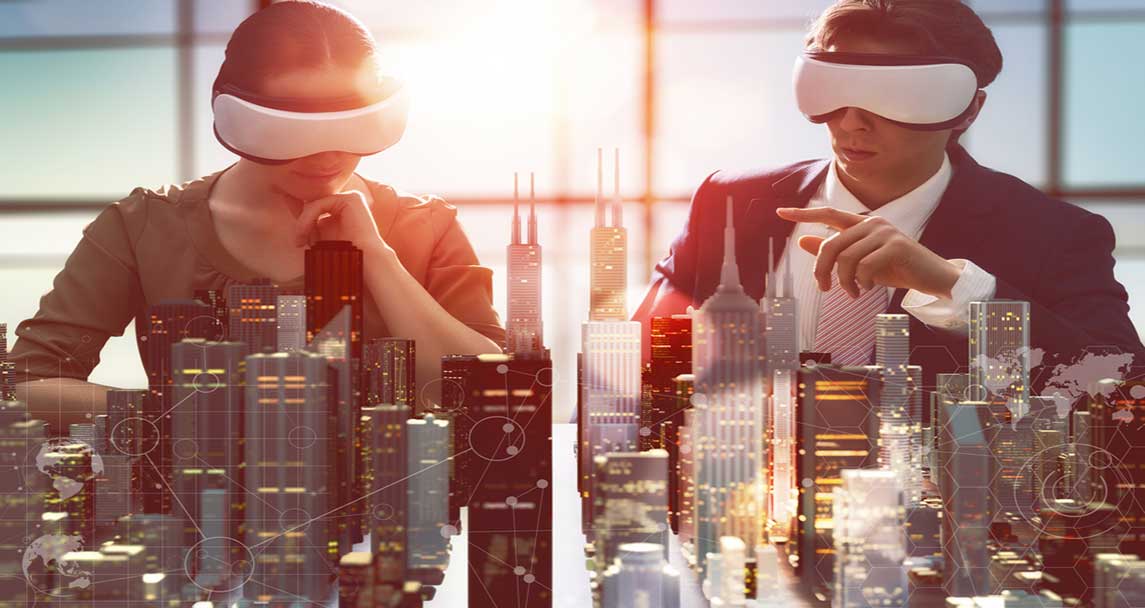How Virtual Reality is Changing Digital Marketing in Real Estate

As the Oculus Rift, HTV and other virtual reality (VR) headsets increasingly creep into our homes and the augmented reality (AR) app phenomenon, Pokémon Go, took over our smartphone screens in mid-2016, VR and AR technology has been hot on everyone’s lips.
Undoubtedly, it wasn’t long until many industries began exploring ways the immersive experience could benefit their businesses, with the construction and building industry being one of the first to implement such technology.
While discussion of virtual reality in the building industry is heavily based around its ability to aid safety and training on site, promote quality control and reduce costs with improved modelling, many discussions fail to address the implication VR has for digital marketing in the field. With the prediction that 171 million consumers will use VR technology this year, and as it becomes more of a “reality” in today’s society, it is important to look at how marketers in the building and real estate industries can capitalise on this opportunity.
To better understand how virtual reality can be applied in the digital marketing space for the building industry and beyond, it is best to define the often confused technology. VR is a digital entertainment technology that allows users to interact and fully immerse themselves in 3D computer-generated environments in a seemingly real and physical way. This usually takes the form of headsets and gloves or controls equipped with sensors to monitor movement and give the user a sense of perspective and motion, as if it were real life. Often, this is confused with augmented reality which is real environments, with digital graphics and images superimposed into them for the user to explore.
While the use of virtual reality environments to simulate real-life scenarios has already been adopted by the building industry, the technology is quickly becoming more prominent as a new advertising and marketing service. In fact, the rise of virtual reality technology couldn’t have come at a better time for marketers, as current digital display ads continually face limitations with consumers increasingly using ad blockers. To put this into perspective, in 2017 PaigeFair reported that in December 2016, 615 million devices were using ad blocking technology to halt the consumer’s exposure towards ads they deemed irrelevant, intrusive and annoying.
With this trend only expected to continually rise in the coming year, the push towards innovative and engaging technology to be used for advertising purposes is becoming more apparent. In fact, consumers seem to be in favour of brands using VR technology as an effective advertising method that better engages them and allows for a personal connection. An infographic and study by the global marketing company, Take1, identified that 71% of consumers assume that a brand who implements VR is modern and forward-thinking, while 52% of respondents admit that as a result of the technology, the would like to be associated with the brand. Furthermore, the same study also identified that 62% of consumers feel a strong sense of engagement with brands using VR, while 53% identified that they would be more likely to purchase from a brand that successfully uses virtual reality technology.
While virtual reality undoubtedly allows for engaging and memorable experiences with consumers and brands, the reasons for its adoption in the real estate and building industry are far more diverse. In fact, according to studies in neuromarketing (the science and psychology behind how a consumer’s brain reacts to marketing stimuli) help demonstrate how VR is one of the most influential tools available to marketers to influence consumer behaviour. To explain, many studies in the field of neuromarketing identify that as consumers, we actually don’t buy products, rather we buy feelings, and as humans, we perceive satisfaction from intangible things that we desire.
While many marketers aim to provoke feelings through traditional marketing methods, virtual reality actually appeals to all 3 parts of the human brain which are able to form perceptions and reactions. These three parts of the brain are identified as the neocortex, responsible for rational thinking, the limbic system which is responsible for emotions, behaviours and motivation, and the oldest and most developed part of the brain, the reptilian brain or the sensory system. In fact, such studies identify that while all these parts of the brain work together in the consumer decision process, the reptilian brain is the most powerful.
To appeal to this part of the brain, it should be noted that the reptilian brain only understands a few words at most. However, the optic nerve directly connects to this part of the brain, meaning visual images and stimuli play a great level of importance. By the use of visuals, this part of our brain is able to identify what it perceives as desirable through our senses, rather than being influenced by rational thoughts. In fact, as virtual reality is entirely a visual environment with sensors attached the equipment used by a consumer, it is undeniable that the technology directly appeals to this aspect of the brain.
Furthermore, the studies surrounding this area of science also identify that advertisements should speak directly to the consumer, as this area of the brain is heavily self-centred and has a survivalist mentality. Therefore, communication needs to focus solely on the consumer, as opposed to the brand and demonstrate the benefits a product or service will have to the consumer. Virtual reality holistically does this, as a user explores the environment for themselves and is able to make implications on how the product will benefit them by experiencing it directly.
Now let’s apply this specifically to the real estate, building and construction industries. As consumer engagement and personalised experiences are ever important in the marketing industry today, consumers interested in purchasing real estate or involved in new developments can use VR to experience properties in a way that is entirely relevant to them. Imagine if a consumer is having a house built, VR programs can let the consumer experience standard properties and designs, and allow them to customise particular features exactly to their taste and preferences.
For example, if the same consumer visits a pre-built display home, yet wishes make modifications to their kitchen by adding in marble bench tops, they may find it difficult to visualise their preferences or even worse, not be aware that such modifications are available. However, with virtual reality technology, they are able to choose and customise their preferences as they experience the environment. In fact, RGC recently developed an app similar to this idea. The Mitsubishi Fridge Finder app allows consumers to see what a new fridge would look like in their home using VR capabilities. Both examples allow for the customer to engage with a fully immersive, memorable and personalised brand experience. Not to mention, this appeals to this 3 levels of the brain which are believed to influence consumer behaviour.
The use of VR in the building and real estate industry also allows for greater accessibility when trying to capture a global consumer. A Business Insider report reveals that overseas investors made up 10% of all purchases in the new home market in the first quarter of 2017 alone. As the demand for Australian property continues to rise amongst offshore buyers, VR can play a great role in levelling out the playing field for local and international consumers. The same report identified that majority of international investments were for all apartments, a competitive market, particularly for first home buyers.
While international buyers may have limited time to view multiple properties and choose what is best for their investment, they may purchase in hotspots, making it more difficult for local and first home buyers to secure an opportunity in that area. However, as VR is not limited by time or location, foreign investors may be able to access other areas they previously may not have considered due to various limitations, yet still assisting the demand for their purchases.
In both examples mentioned above, VR can also help predict outcomes which can help inform further advertising and marketing strategies and influence other business processes. For examples, you may be able to collect specific data about consumers and their preferences and create solutions customised to a profile they fit. So if a group of consumers identify as a first home buyer, and data gathered through their individual experiences identifies the group collectively increase the size of their kitchen, as an example, it can inform other aspects of marketing. You may wish to engage in social media marketing or content marketing strategies that discusses kitchen sizing and addresses this groups concern.
A spin-off form of VR technology that has also been widely seen is the use of 360-degree video. This provides great opportunity for the real estate and building industry, particularly as a video advertising service on social media platforms such as Facebook, to offer their immersive experiences to those who may not be looking to buy a new home or source building companies, yet potentially need their services in the future. As mentioned earlier, many consumers have positive perceptions towards brands who use such a feature, and early adoption will place your brand favourable amongst competitors.
While VR technology is still relatively in its infancy, the role it will play in digital marketing for the building in real estate industry is immense. While primarily beneficial in the design process, VR can help consumers immerse themselves in their purchases and personalise the experience specifically to meet their needs and desires. VR technology also appeals to the psychology surrounding consumer behaviour and purchasing in all industries and markets. Furthermore, the technology creates greater accessibility for all consumers, provides data to inform other business efforts and can help innovate social media marketing in a more engaging and competitive way.
At RGC Digital Marketing, we are a digital marketing agency based in Sydney with experience in various innovative online marketing services that drive consumer engagement. We are an award winning mobile application and website design agency with experience in VR technology and the benefits it has on digital marketing in various industries. For more information on virtual reality and other digital advertising services that will connect consumers to your brand, please contact Richard on (02) 8883 2988 or email richard@rgcadvertising.com.au


